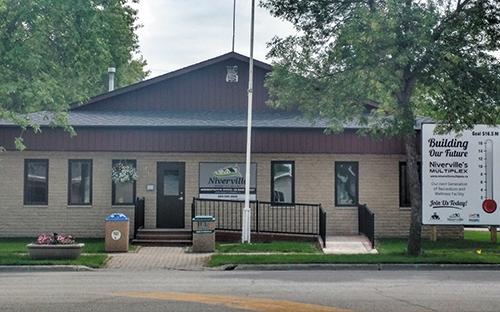On December 4, Niverville held a public council meeting at 9:00 a.m. to discuss a number of conditional use permits that have come forward. Owners of businesses coming to 40 Drovers Run, including Negash Coffee and Niverville’s Pizzeria, requested conditional use permits for the opening of their new businesses in the spring of 2019. Both were granted by acclamation of council.
While these businesses are, as yet, unable to guarantee an exact opening date, both were able to establish hours of operation. Niverville’s Pizzeria will have open hours for their takeout and delivery service from noon to 9:00 p.m., Monday to Thursday, and noon to midnight on Friday and Saturday. They will be closed on Sundays.
Negash Coffee will be open from 6:00 a.m. until 6:00 p.m. every day of the week. The business will include both sit-down coffee service in a small café setting along with retail coffee products sold fresh from their onsite coffee bean roasting plant.
The owners of Red River Co-op and Country Snacks have requested an extension on their original construction deadline, due to construction delays. A new deadline of April 2020 was granted by council. The owners anticipate that construction of their new gas pump expansion will begin in the spring of 2019.
Developer Luke Wiebe and a contingent of Niverville residents attended the council meeting to address a proposition by Wiebe for a second multifamily housing complex to run adjacent to his newest rental development on Fourth Avenue South. The original development included four sections of attached townhouses, providing a total of 46 one- and three-bedroom units. Three of the buildings are complete and sold out. The fourth is still under construction.
While the first development caters to families with young children, Wiebe says his goal in the secondary plan is to provide more units for individuals and seniors who are interested in housing rentals without stairs. These would include one- and two-bedroom units.
“We’ve had incredible uptake of tenants coming from anywhere from Winnipeg to Niverville and surrounding communities,” Wiebe told council. “We had our first building completely rented before the foundation was even in. We’ve had a steady stream of new people contacting us. As a realtor, I know that Niverville has been a booming community for many years and we hope to continue to contribute to that.”
The requested conditional use permit for the proposed development immediately south of the first would allow for a total of 60 multifamily units in five attached townhouse sections. Variations were also requested on back and front yard zoning and fence heights, to reduce the number of required parking stalls from 120 to 103, a variance on the required number of handicap parking stalls, and a request to reduce the internal access roadway from 25 to 22 feet to accommodate more buildings on a similarly sized lot.
Concerns were heard from a number of residents in attendance and through emailed submissions. Many disapproved of the idea of adding an even heavier concentration of family units to this small parcel of land bordering Fourth Avenue South. Concerns were raised over increased traffic loads on a street used as a school route by many local children. As well, parking is a very real concern to residents in the area who claim that overflow parking already extends onto the street and into the neighbouring Fourth Avenue Bible Church parking lot from the first development.
A member of the Fourth Avenue Bible Church raised concerns over the effect that this residual parking has had on parishioners’ access to the church on Sunday mornings. Along with that, construction equipment parked on their lot has left the parking lot in a state of degradation.
Other residents expressed a sense of sadness and loss over the intent to reduce still more of the street’s treed greenspace to concrete living space in the name of progress. According to plans presented by the developer at this stage, no new greenspace is planned for the second development.
“I hear what the people are saying,” said councillor John Funk. “It’s almost like a sardine can where we’re trying to squeeze too many [units] in there. [As for] greenspaces, there’s not even a walkway to [any] greenspace. The road [also] looks too narrow to even back out of the garage and not interfere with traffic coming.”
“This is… a preliminary site plan,” countered Wiebe. “As far as the sardine can, we understand that it’s ambitious, but I want everyone to know that we have the zoning for three-storey and we’re not willing and prepared to sign something that states that there can be no three-storeys. I have committed so far to put two-storey units on here to be more mindful of neighbours.”
Mayor Myron Dyck provided clarification to the concern over traffic volumes, stating that before the zoning was changed to accommodate multifamily housing in the area, engineers were brought in to ensure that traffic would not adversely affect what the street could safely accommodate.
Chief Administrative Officer Eric King also reminded the developer and concerned residents that, while many things are theoretically possible based on the town’s zoning bylaws, conditional use hearings would be required by council under every circumstance requested by a developer.
In the end, council opted to table the hearing until further discussion can take place in a closed council meeting.
In further agenda items, council voted in favour of awarding to WSP Canada the contract for design of the Community Resource Centre and high school parking lot and land drainage system for a cost of $17,500 plus taxes. This design will include engineering and geotech testing.


